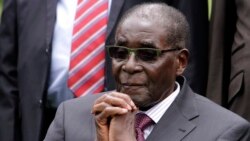President Robert Mugabe of Zimbabwe was among world leaders who gathered in New York, Friday, for the adoption of the 2030 Agenda for Sustainable Development, which comprises 17 goals that have officially replaced and expanded the 8 Millennium Development Goals (MDGs), adopted in 2000.
As was the aim of the MDGs, the new goals lay out a framework to eradicate poverty and hunger, reduce inequality, enhance access to water, sanitation and education, protect the planet, among other goals and targets, over the next 15 years or 2030.
Experts say the new goals are more ambitious that the MDGs which were not successfully implemented in many countries, particularly in developing nations like Zimbabwe.
Speaking at the occasion, United Nations Secretary General Ban Ki Moon, said for the goals to be met successfully, every nation and individual should commit to their successful implementation and commitment.
“Seventeen sustainable goals are our guide. They are a to-do list for people, and planet and the blueprint for success,” said Ban, adding, “we will need your high-level political commitment, we will need a renewed global partnership.”
President Mugabe, who also addressed the 193-Member United Nations General Assembly, said Zimbabwe has made strides in alleviating poverty in the country, due to the land reform program, many deemed controversial.
“Key component of our empowerment agenda has been the land reform program, which contrary to its detractors has lifted many families out of poverty,” said Mr. Mugabe. “We are determined to leave no one behind, in the spirit of the new agenda,” he committed.
President Mugabe also implored world leaders and institutions to also lend a hand where need to ensure that national economies grow.
“For growth to be achieve, in addition to appropriate domestic policies, our countries need a coherent and supportive international environment,” he said.
As a solution to this, President Mugabe urged international financial institutions like the World Bank and the International Monetary Fund to address the issue of debt. An IMF delegation that visited Zimbabwe recently under a Staff Monitored Program, commended the country’s reform efforts to bring down it’s nearly $10 billion debt and arrears, but ruled out debt forgiveness. President Mugabe said its time for a new approach toward debt and debt-forgiveness.
“The reform of the Bretton Woods Institutions is long overdue,” said Mr. Mugabe, adding that “the issue of debt sustainability calls for urgent, clear-headed resolutions. These are not new issues. They’ve been with us for too long,” he stressed. “They constitute a huge part of the baggage we need to shed off,” Mugabe said.
President Mugabe said his country was committed to the newly adopted goals, and that Zimbabwe had “adopted and are implementing several programs to empower our previously disadvantaged people.”
The 17-goals adopted by heads of state and government Friday, are as follows:
- No Poverty
- Zero Hunger
- Good Health and Well-Being
- Quality Education
- Gender Equality
- Clean Water and Sanitation
- Affordable and Clean Energy
- Decent Work and Economic Growth
- Industry, Innovation and Infrastructure
- Reduced Inequalities
- Sustainable Cities and Communities
- Responsible Consumption and Production
- Climate Action
- Live Below Water
- Life on Land
- Peace, Justice and Strong Institutions
- Partnerships for the Goals.







